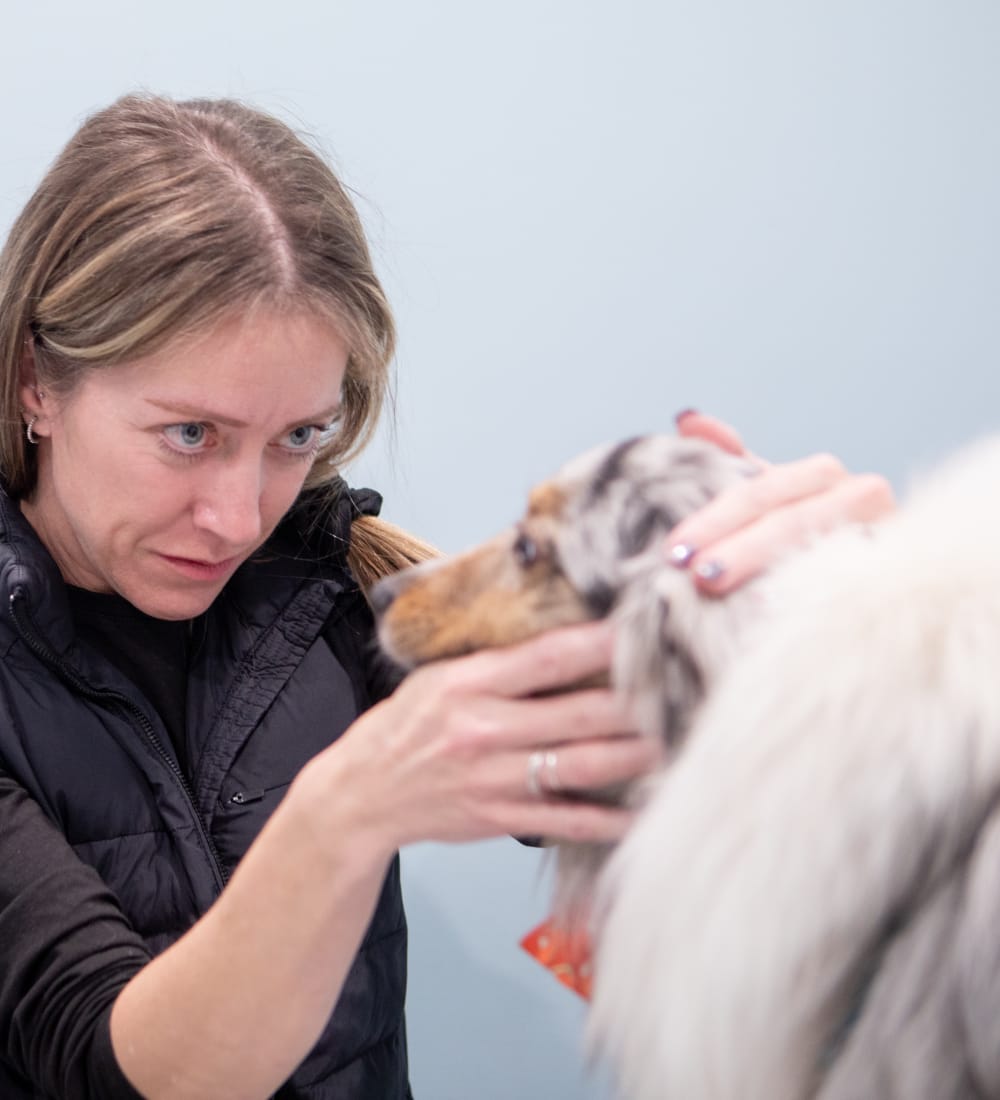
Specialized Eye Care for Long Island Pets
The Veterinary Medical Center of Long Island was conceived with the notion that pet owners and their family veterinarians expect the highest level of veterinary care possible. Our ophthalmology department operates on this notion by providing exceptional patient eye care for cats, dogs and horses.
Our ophthalmology department includes a state-of-the-art surgical suite with the finest ophthalmologic, surgical, and anesthesia monitoring equipment available. We are dedicated to the ongoing growth and advancements in ophthalmology and ophthalmic surgery in order to continue to provide the most progressive care possible for our patients.
We will ensure that all medical and surgical options are explained clearly and that you are fully involved in the decision-making process. During surgery, pets are continuously monitored from arrival to recovery. Complete attention continues post-operatively, and the greatest importance is given to post-surgical pain management.
Board-Certified Veterinary Ophthalmologists
Our veterinary ophthalmologists have completed additional education after veterinary school that focuses exclusively on treating eye disorders in animals along with completing the required exams and extensive training to become board-certified.
What to Expect During Your First Visit
We aim to make your visit a success from the moment you walk through the door. Once you enter our facility, you will be warmly greeted by our receptionists who will request that you complete a new patient form.
If your pet is taking any medications, you should bring these with you to the appointment. Recent blood tests or pertinent records should be faxed to us in advance of your visit.
-
Patient History & Diagnostics
Once you have shared all of your information with our team, we will bring you and your pet into an examination room and obtain a thorough medical history.
Once we have discussed potential concerns, our vet will perform initial diagnostic tests including a Schirmer tear test, applanation tonometry, and vital staining.
-
Comprehensive Exam & Additional Diagnostics
Once the diagnostics are complete, our ophthalmologist will perform an eye examination. The exam will include vision testing, slit lamp examination (biomicroscopy), and indirect ophthalmoscopy.
The ophthalmologist will then discuss with you the current ocular condition and make therapeutic and/or further diagnostic recommendations.
There may be a recommendation for additional diagnostics including gonioscopy, nasolacrimal flushing, harvesting of corneal and conjunctival cells, cytology, aqueocentesis, ocular ultrasound, electroretinography, genetic testing for inherited eye disease, and blood pressure measurement.
-
Discharge & Next Steps
Once the examination is complete, the ophthalmologist will provide you with discharge instructions containing a diagnosis, directions for medical therapy, and a description of the current ocular condition.
The ophthalmologist will also send your primary care veterinarian a detailed letter to inform them of their findings. We strive to work with your veterinarian to provide comprehensive and cohesive care for your pet.
Symptoms of Eye Conditions
Eye conditions and diseases can have a variety of symptoms, but some signs are seen more frequently than others. If your pet is experiencing any of the following symptoms, your veterinarian can contact us for an appointment with our trained veterinary ophthalmologist.
- Discharge
- Squinting
- Tearing / Tear-Stained Fur
- Swelling
- Vision Loss (sudden)
- Cloudiness
- Eye Rubbing
- Change in Eye Color
- Red Eye
- Vision Loss (gradual)
Ophthalmic Services
- Applanation Tonometry (Intraocular Pressure)
- Aqueous & Vitreal CentesisConjunctival Biopsy
- Doppler Manometry (Blood Pressure)
- Electroretinography
- Equine & Large Animal Examination
- Equine Ocular Lavage
- Fluorescein Staining
- Gonioscopy
- Grid Keratotomy
- Indirect & Direct Retinal Examination
- Nasolacrimal Flush
- Ocular & Fundic Fhotography
- Schirmer Tear Testing
- Screening for Inheritable Eye Diseases (Canine Eye Registration Foundation)
- Slit Lamp Biomicroscopy
- Ultrasonography of the Eye & Orbit
- Testing for Ocular Refractive Errors (Nearsighness vs. Farsightness)
Ophthalmic Surgical Services
- Ahmed Glaucoma Valve Placement
- Cataract Phacoemulsification & Intraocular Lens Implantation
- Conjunctival, Corneoscleral, & Corneal Grafting
- Cryoablation of Distichia, Ectopic Cilia, & Ocular Neoplasm
- Endoscopic (Endolaser) Cyclophotocoagulation for Glaucoma
- Enucleation with Orbital Prosthesis
- Evisceration with Intraocular Prosthesis
- Eyelid Resection & Reconstruction
- Laser Surgery for Glaucoma, Ocular Neoplasm, & Retinal Detachment
- Luxated Lens Removal
- Repair of Prolapsed Nictitans Gland (Third Eyelid)
- Superficial Keratectomy
